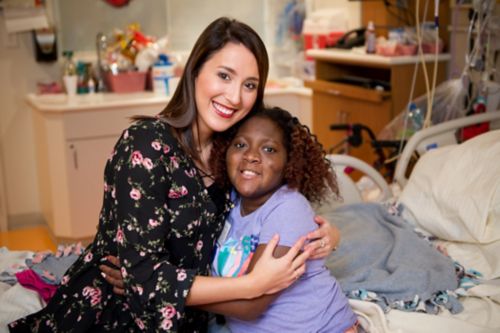St. Jude Family of Websites
Explore our cutting edge research, world-class patient care, career opportunities and more.
St. Jude Children's Research Hospital Home

- Fundraising
St. Jude Family of Websites
Explore our cutting edge research, world-class patient care, career opportunities and more.
St. Jude Children's Research Hospital Home

- Fundraising
The genetic roots of cancer
The origins of a cancer are hidden in a child's DNA. Using next-generation technologies, St. Jude is revealing these genetic beginnings and developing new cures.
Read how unique, large-scale research initiatives and clinical programs at St. Jude are driving landmark discoveries and bringing a new kind of precision care to our patients.
Discovering cancer's origins
Cancer begins when changes in DNA trigger cells to grow out of control. Through the Pediatric Cancer Genome Project, St. Jude and Washington University in St. Louis have pinpointed the DNA changes behind some of the toughest childhood cancers.
The project, initiated in 2010, has resulted in a wealth of new discoveries revealing the genetic Achilles heels of pediatric cancers. Named as one of TIME magazine's annual Top 10 Medical Breakthroughs, this project has sparked innovative clinical trials to test new treatments for children.
Featured research: A benchmark defined
Research led by St. Jude has established a benchmark in the pediatric cancer field. By looking at the genetic makeup of 1,120 children with cancer, investigators found that nearly one out of 10 had been born with an increased genetic risk for the disease. They also discovered unexpected links between adult cancer genes and childhood disease.
This study was highlighted as one of the most important clinical advances of 2016 by the American Society for Clinical Oncology.
A new clinical frontier
Each child is unique, and every cancer is different. As findings from the Pediatric Cancer Genome Project continue to drive basic research on the genetics of cancer, St. Jude has launched an ambitious program to apply its powerful technologies where they are needed most: the bedsides of our patients.
The vision of the program is to use technology called genome sequencing to carefully scrutinize every one of the 3 billion letters of the genetic code of patients and their cancers. When analyzed with advanced computing technology, the results can be used to accurately identify a cancer and find its genetic vulnerabilities. These results can also show if the patient was born with an increased risk for cancer.
Bringing large-scale genome sequencing out of the research lab and into the clinic is a massive endeavor. Using the technology in patient care requires deep expertise, state-of-the-art facilities, and focused, mission-driven research, all major strengths of St. Jude.
This technology offers the promise of true precision medicine, in which treatment and long-term care can be tailored for each child.
Featured clinical trial: Genomes for Kids

Genomes for Kids (G4K) is a St. Jude clinical research study designed to lay the groundwork for transforming childhood cancer therapy. Through this novel study, researchers are learning more about childhood tumors, how genome sequencing might help predict a tumor's response to treatment, and the best ways to share the test results with families.
Understanding cancer risk
A child can be born with an increased genetic risk for cancer. For some children, this happens by chance; for others, the risk is passed down from their parents.
To help children and families with a genetic risk of cancer, St. Jude established the Hereditary Cancer Predisposition Clinic. It is one of the first programs of its kind for children with cancer.
Through the clinic, patients and families work closely with a team of doctors, geneticists and genetic counselors. The team helps families understand their cancer risk, get appropriate testing and make decisions to help them stay healthy.